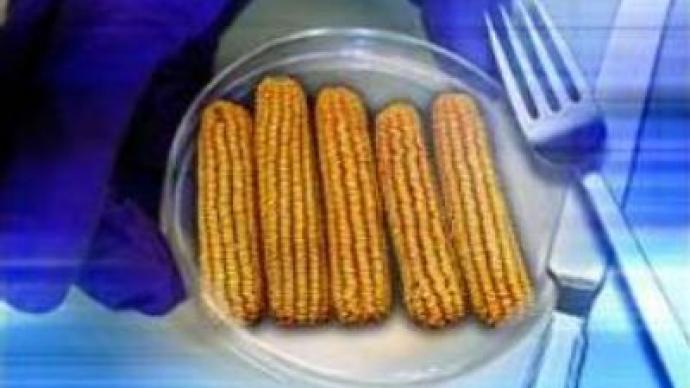Russia joins battle over GM foods

In July this year, Moscow will introduce a voluntary labeling scheme to show which products contain GM ingredients. According to polls, 95% percent of Russians avare of GM foods say they would buy them if they were labeled as such.
The global debate about the safety of genetically modified foods shows no signs of winding down. Many are waiting to see which way Russia will go. Voluntary labeling is already in place in the EU, while across the Atlantic, labels on GM food are not mandatory. It looks like Russia is following Europe's example.Europe has been battling the World Trade Organization, after the US, Canada and Argentina made it clear they think the EU's restrictions on GM imports is illegal.In Europe, foods produced from genetically modified organisms must be clearly labeled, where in the United States there is no such requirement.Many Europeans don't want GM food at all. While the U.S. is the largest exporter of GM products the banning them can be bad for business.“In Russia a considerable majority of the scientific community is closer to the position of the EU and even more cautious. The current legislation is quite strict on GM imports. The public and scientists are rather concerned about GM foods. While major companies are interested in importing GM products. Nevertheless, the legislation is expected to change while being cautious about GM foods,” underlines Aleksandr Ishkov, the Director of the Russian Environmental Protection Policy in Potsdam, Germany.On July first Moscow will introduce a voluntary system of food labels indicating that a product does not contain genetically modified ingredients.Some biologists believe that GM food can have a negative effect on the gene pool and reduce biological diversity. Scientist do not know what effect they will have in the long term on the Human body.The president of the National Genetic Security Association says the negative effect of GM foods is becoming more evident.“The amount of scientific facts are increasing and it shows the negative impact of GM foods not only on the environment and ecology, but on mammals as well and the number of people against GM foods is growing around the world,” warns Aleksandr Baranov, the President of the National Genetic Security Association, Moscow.In the last couple of years imports of GM foods to Russia have increased more than 100 times. By law products that contain more than 0,9 % GM ingredients must be labeled – but this rule is often ignored.Greenpeace Russia claims in most regions of the country GM products account for 10-20% of the market and in some cities up to 50%. But the idea of creating GM-free zones is on the table in several major Russian regions.According to polls 95% percent of Russians who have heard of GM foods say they would buy them if they were labeled as such. And starting in July at least they will begin to have a chance at choice.
You can share this story on social media:












